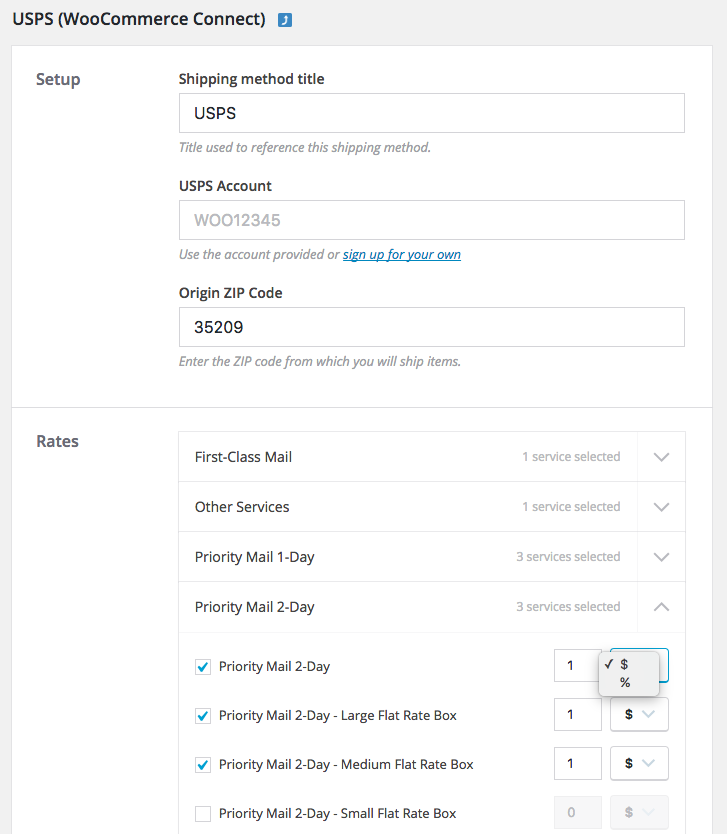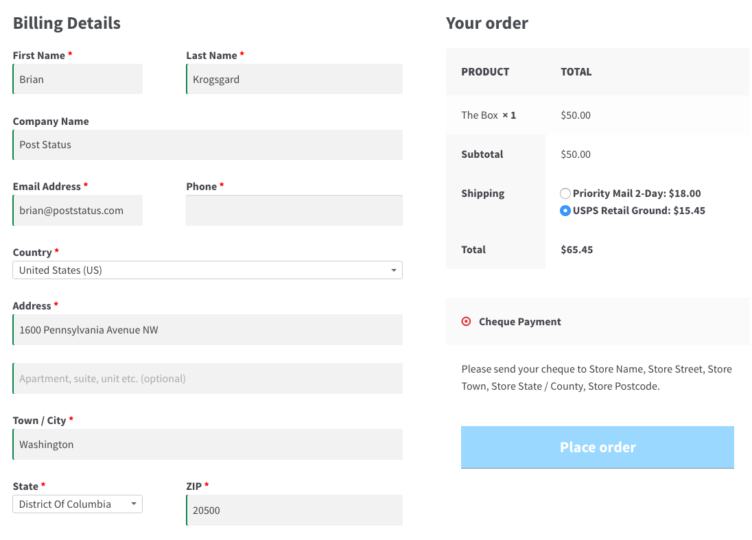Last week, Automattic introduced WooCommerce Connect, a Jetpack-esque suite of tools for WooCommerce, where modules could utilize the processing power of WordPress.com to run particular elements of eCommerce websites.
WooCommerce Connect requires Jetpack, and therefore also a WordPress.com account, in order to run. Jetpack now has 35 modules, originally with the purpose of making publishing more seamless. It should surprise me that WooCommerce Connect — a plugin geared toward eCommerce, not publishing posts — requires Jetpack, but it doesn’t.
Nevertheless, I understand why they require Jetpack. A lot of existing utilities in Jetpack are useful for WooCommerce, and it seems like Jetpack is more and more focusing on enhancing sites generally (security, backups, etc), versus targeting traditional content publishers.
So, I signed up for the WooCommerce Connect Alpha/Beta, and got to work trying out the first module they are creating: a USPS shipping integration.
The integration itself is fairly straightforward. Shipping zones (formerly part of table rate shipping extension) are going into WooCommerce core in 2.6, and the USPS (United States Postal Service) integration (also a current extension) allows the creation of a shipping method for a particular zone. Zones in WooCommerce are locations (like Alabama, or the United States, or whatever), and methods are things like USPS, Flat Rate, Free Shipping, etc.
Once you enable the USPS method, the “connect” part kicks in: the tables for configuring the variety of USPS shipping styles are all React driven and powered through WordPress.com servers.

As updates become necessary over time to adjust available shipping methods from USPS, WooCommerce can do so dynamically, without requiring plugin updates.
Then, on the front-end during checkout, users will see the available shipping methods and rates as soon as the address is filled out:

Again, WooCommerce can communicate directly with the USPS API from the WordPress.com side, preventing the need for API compatibility updates in the core plugin. And this is the core of the idea behind WooCommerce Connect.
WooCommerce Connect Roadmap
The USPS shipping module is already teasing a packaging component (to help automatically configure multi-product box shipping configurations) that will be available upon Beta (it’s in Alpha now). But in the email confirmation for testers, Automattic highlights more in regards to the roadmap ahead for WooCommerce Connect:
What’s next: the beta and beyond
While you’re alpha testing, we are already actively working on the beta, which includes:
- Canada Post support
- Integration with the WooCommerce onboarding wizard
- UI improvements to the rates section
- The ability to set up boxes for shipping
- A self help page with system status info and
- Improved styles.
The grand plan: roll out Connect into a future WooCommerce core release.
The last sentence is confusing to me. I don’t fully understand how the relationship will work between WooCommerce Connect and WooCommerce core: will it be a testing ground, or a place for utilizing WordPress.com’s infrastructure? I guess it will probably be both.
In addition to shipping management, payment gateways are definitely on the roadmap for WooCommerce Connect. Again, the ability to manage API integrations from a central source will be beneficial; I presume that is a common source for support requests, as merchants upgrade but site owners don’t update their gateway plugins. It also allows Automattic to worry less about backward compatibility concerns, as they control the host environment.
As a WooCommerce store owner, I see good and bad with this move toward a quasi-SaaS from Automattic. I like that some features will be more reliable, and that I can offload some work to them. But at the same time, it makes me somewhat uneasy just how much more data Automattic will gain from my store with the additional connections — and I have little to no control over that.
Also, like happened with Jetpack, it’ll be harder to avoid Connect in favor of fully self-hosted options for similar features, because Jetpack (and Connect will be for eCommerce) is a behemoth in the marketplace. That could be worrisome for extension sellers, because (again like with Jetpack) Automattic could choose to gobble up your product’s functionality into WooCommerce Connect at any time and there’s nothing you can do about it.
Connect, Jetpack, and Automattic’s long term monetization opportunity
WooCommerce Connect is another step forward for Automattic’s monetization plans. They have long downplayed monetization in favor of building features for site owners. However, we’ve seen many Jetpack “Premium” and “Business” marketing iterations over the last year or so, and it’s clear that monetizing is more on their radar than it once was.
There are now teams — both for Automattic broadly and for WooCommerce — for marketing and advertising. Their core products have a huge amount of leverage on widely utilized open source software (25% of all websites with WordPress, and 30% of all eCommerce sites with WooCommerce). Their goal appears to be to further penetrate that base of sites that use the underlying software — attempting to make site owners feel as if it would be silly to not use free add-ons that add helpful features — and then over time, to monetize a percentage of those users with various SaaS efforts.
As they test their marketing efforts for upgrades, they can get an idea of what kind of conversion rate is possible. It’s a common monetization strategy for startups: push adoption, create a feeling of inevitability, create the upsell, iterate marketing for the upsell over time. If you don’t have to have the cash right now, then there is no reason to rush monetization, or beat someone over the head with the upsell; it gives you time to enhance the product, and make it even more compelling of an upsell down the road, resulting in an even better conversion rate, and more money long term.
WooCommerce on its own can certainly be a big money maker. But if Automattic can decrease the support burden over time (making certain extensions hosted helps, like I mention above) while also increasing the value and experience of the product to end users, it has a lot more scalable monetization potential. WooCommerce Connect can help that, and since it’s still a self-hosted product at the core, it’s also differentiated from a more crowded fully hosted market.
